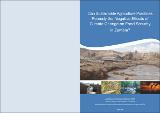Can Sustainable Agriculture Practices Remedy the Negative Effects of Climate Change on Food Security in Zambia?

View/
Date
2011-06Author
Chilufya, Gregory C
Type
Research PaperLanguage
enItem Usage Stats
47
views
views
247
downloads
downloads
Abstract
This report was commissioned by the Jesuit Centre for Theological Reflection (JCTR) to inform advocacy and communication on conditions relating to food security and climate change. The study was undertaken during the period that the National Climate Change Response Strategy and its Communication Strategy were being formulated by the Ministry of Tourism, Environment and Natural Resources. As such, this study will in some way, complement their consultation processes.
Description
Some climate change arises from natural factors such as changes in the sun’s intensity, the earth-sun distance and the earth’s orbit around the sun. This natural climate change is slow, small and has been always there. This is termed climate variability. However, it is the increased human activities (notably industrial, agricultural and land use) that are changing the composition of the Earth’s atmosphere at an unprecedented pace.4 The discussions in this report are limited to the agricultural and land use aspects of climate change. The State of Environment in Zambia (2000) also alludes to the fact that climate change refers to any change in classical 30-year climatology regardless of its causes. This sets the minimum timeline within which this study addresses climate change and food security in Zambia.